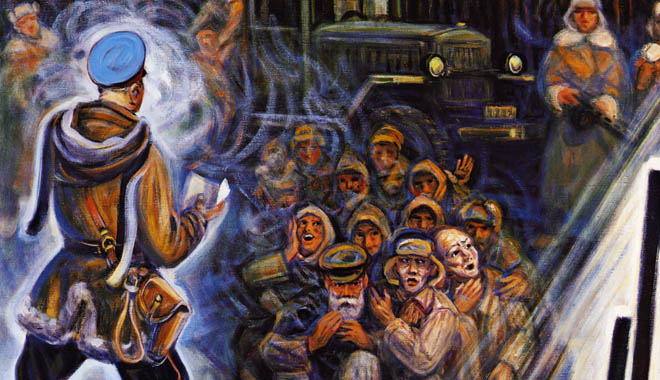«(...) The Heritage Foundation is exhibiting a “new” collection of 50 paintings of the Soviet Gulag, the infamous penal system for political prisoners and slave laborers. They were painted over a 40-year period by Nikolai Getman, a Ukrainian who spent eight years in Soviet concentration camps in Siberia and Kolyma. His only crime was being present at a meeting of artists where one drew a caricature of Stalin on a cigarette box. (...) After Getman was released in 1953, he began secretly to paint a series of pictures about life in the Gulag. He told no one about his paintings — not even his wife — knowing that if they were discovered, he would be imprisoned again or perhaps even killed. The paintings are haunting. They are the only visual counterpart to Aleksandr Solzhenitsyn’s writings, which exposed this terrible system of mass imprisonment that Robert Conquest has rightly called “unexampled coldblooded inhumanity.” We will never know how many innocent people disappeared into the Gulag, but the estimates of those who died in the Gulag and under Soviet Communism range from 15 million to 30 million. The only difference between the Holocaust and the Gulag is that the Soviet Communists never got around to using gas to kill their prisoners — just old-fashioned bullets, beatings, starvation, and literally working them to death. Getman’s stark paintings cover everything from the transportation of prisoners to the camps in unheated trucks and ships, to the horrible and almost unspeakable living conditions in the Gulag. We see the routine brutality with which prisoners were treated. The fragile existence they led is captured in Getman’s paintings, which represent an enormous accomplishment considering that all of the scenes were painted from memory. They represent events that Getman either witnessed himself or heard about firsthand.
One painting shows the despairing faces of a group of men taken from their barracks in the middle of the night and executed by the NKVD (the forerunner of the KGB), the secret-police organization that ran the entire Gulag system. These kinds of executions occurred constantly for no apparent reasons. All of the prisoners knew that if you were taken out of your barracks in the middle of the night, you never came back.
Nikolai Getman
Jamestown Foundation, Washington D.C.
(...) Nikolai Getman was convinced that it was his duty to leave behind a testimony to the fate of the millions of prisoners who died and should not be forgotten. He survived under such unimaginable circumstances because of his absolute conviction that good would triumph over evil. He concluded that one of the great human virtues is strength of will, which even the terrible Gulag machine couldn’t extinguish. The tragic repression and lawlessness he saw in the camps persuaded him of the value of man and of the dignity of his mind and spirit. Getman realized that “each of us is responsible for the future” — and because of that responsibility, he could not be silent. (...)»


Sem comentários:
Enviar um comentário